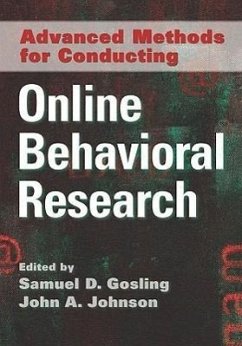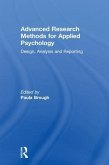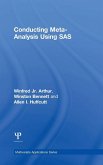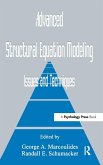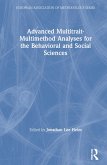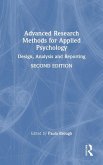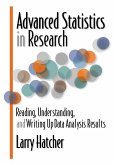Advanced Methods for Conducting Online Behavioral Research
Herausgeber: Gosling, Sam; Johnson, John A
Advanced Methods for Conducting Online Behavioral Research
Herausgeber: Gosling, Sam; Johnson, John A
- Gebundenes Buch
- Merkliste
- Auf die Merkliste
- Bewerten Bewerten
- Teilen
- Produkt teilen
- Produkterinnerung
- Produkterinnerung
This book shows readers how to conduct online experiments, surveys, and ability testing, use advanced graphic tools, apply automatic text analysis tools, check the validity of protocols, and much more.
Andere Kunden interessierten sich auch für
![Advanced Research Methods for Applied Psychology Advanced Research Methods for Applied Psychology]() Advanced Research Methods for Applied Psychology197,99 €
Advanced Research Methods for Applied Psychology197,99 €![Conducting Meta-Analysis Using SAS Conducting Meta-Analysis Using SAS]() Winfred Arthur JrConducting Meta-Analysis Using SAS190,99 €
Winfred Arthur JrConducting Meta-Analysis Using SAS190,99 €![Advanced Structural Equation Modeling Advanced Structural Equation Modeling]() Advanced Structural Equation Modeling197,99 €
Advanced Structural Equation Modeling197,99 €![Advanced Multitrait-Multimethod Analyses for the Behavioral and Social Sciences Advanced Multitrait-Multimethod Analyses for the Behavioral and Social Sciences]() Advanced Multitrait-Multimethod Analyses for the Behavioral and Social Sciences195,99 €
Advanced Multitrait-Multimethod Analyses for the Behavioral and Social Sciences195,99 €![Advanced Research Methods for Applied Psychology Advanced Research Methods for Applied Psychology]() Advanced Research Methods for Applied Psychology185,99 €
Advanced Research Methods for Applied Psychology185,99 €![Advanced Statistics in Research Advanced Statistics in Research]() Larry HatcherAdvanced Statistics in Research48,99 €
Larry HatcherAdvanced Statistics in Research48,99 €![Conducting Research in Developmental Psychology Conducting Research in Developmental Psychology]() Conducting Research in Developmental Psychology194,99 €
Conducting Research in Developmental Psychology194,99 €-
-
-
This book shows readers how to conduct online experiments, surveys, and ability testing, use advanced graphic tools, apply automatic text analysis tools, check the validity of protocols, and much more.
Hinweis: Dieser Artikel kann nur an eine deutsche Lieferadresse ausgeliefert werden.
Hinweis: Dieser Artikel kann nur an eine deutsche Lieferadresse ausgeliefert werden.
Produktdetails
- Produktdetails
- Verlag: American Psychological Association (APA)
- Seitenzahl: 286
- Erscheinungstermin: 1. Januar 2010
- Englisch
- Abmessung: 264mm x 184mm x 29mm
- Gewicht: 695g
- ISBN-13: 9781433806957
- ISBN-10: 1433806959
- Artikelnr.: 28150918
- Herstellerkennzeichnung
- Libri GmbH
- Europaallee 1
- 36244 Bad Hersfeld
- gpsr@libri.de
- Verlag: American Psychological Association (APA)
- Seitenzahl: 286
- Erscheinungstermin: 1. Januar 2010
- Englisch
- Abmessung: 264mm x 184mm x 29mm
- Gewicht: 695g
- ISBN-13: 9781433806957
- ISBN-10: 1433806959
- Artikelnr.: 28150918
- Herstellerkennzeichnung
- Libri GmbH
- Europaallee 1
- 36244 Bad Hersfeld
- gpsr@libri.de
Edited by Samuel D. Gosling and John A. Johnson
Contributors
I. Getting Started
1. How to Use This Book
—John A. Johnson and Samuel D. Gosling
2. An Overview of Major Techniques of Web-Based Research
—Michael H. Birnbaum
II. Considerations When Designing Web Pages
1. Design and Formatting in Internet-Based Research
—Ulf-Dietrich Reips
2. Using Graphics, Photographs, and Dynamic Media
—John H. Krantz and John E. Williams
3. Drag & Drop: A Flexible Method for Moving Objects, Implementing
Rankings, and a Wide Range of Other Applications
—Wolfgang Neubarth
III. Studying Internet Behavior
1. Collecting Data From Social Networking Web Sites and Blogs
—Elizabeth Mazur
2. Using Automated "Field Notes" to Observe the Behavior of Online
Subjects
—Sonja Utz
3. Automatic Text Analysis
—Matthias R. Mehl and Alastair J. Gill
IV. Transporting Traditional Methodologies to the Web
1. Internet-Based Ability Testing
—Ulrich Schroeders, Oliver Wilhelm, and Stefan Schipolowski
2. Web-Based Self-Report Personality Scales
—John A. Johnson
3. Online Collection of Informant Reports
—Simine Vazire
4. Conducting Online Surveys
—Tracy L. Tuten
5. Conducing True Experiments on the Web
—Ulf-Dietrich Reips and John H. Krantz
V. Cross-Cutting Issues
1. Using Lotteries, Loyalty Points, and Other Incentives to Increase
Participant Response and Completion
—Anja S. Göritz
2. Security and Data Protection: Collection, Storage, and Feedback in
Internet Research
—Olaf Thiele and Lars Kaczmirek
3. Ethical Issues in Psychological Research on the Internet
—Tom Buchanan and John E. Williams
Index
About the Editors
I. Getting Started
1. How to Use This Book
—John A. Johnson and Samuel D. Gosling
2. An Overview of Major Techniques of Web-Based Research
—Michael H. Birnbaum
II. Considerations When Designing Web Pages
1. Design and Formatting in Internet-Based Research
—Ulf-Dietrich Reips
2. Using Graphics, Photographs, and Dynamic Media
—John H. Krantz and John E. Williams
3. Drag & Drop: A Flexible Method for Moving Objects, Implementing
Rankings, and a Wide Range of Other Applications
—Wolfgang Neubarth
III. Studying Internet Behavior
1. Collecting Data From Social Networking Web Sites and Blogs
—Elizabeth Mazur
2. Using Automated "Field Notes" to Observe the Behavior of Online
Subjects
—Sonja Utz
3. Automatic Text Analysis
—Matthias R. Mehl and Alastair J. Gill
IV. Transporting Traditional Methodologies to the Web
1. Internet-Based Ability Testing
—Ulrich Schroeders, Oliver Wilhelm, and Stefan Schipolowski
2. Web-Based Self-Report Personality Scales
—John A. Johnson
3. Online Collection of Informant Reports
—Simine Vazire
4. Conducting Online Surveys
—Tracy L. Tuten
5. Conducing True Experiments on the Web
—Ulf-Dietrich Reips and John H. Krantz
V. Cross-Cutting Issues
1. Using Lotteries, Loyalty Points, and Other Incentives to Increase
Participant Response and Completion
—Anja S. Göritz
2. Security and Data Protection: Collection, Storage, and Feedback in
Internet Research
—Olaf Thiele and Lars Kaczmirek
3. Ethical Issues in Psychological Research on the Internet
—Tom Buchanan and John E. Williams
Index
About the Editors
Contributors
I. Getting Started
1. How to Use This Book
—John A. Johnson and Samuel D. Gosling
2. An Overview of Major Techniques of Web-Based Research
—Michael H. Birnbaum
II. Considerations When Designing Web Pages
1. Design and Formatting in Internet-Based Research
—Ulf-Dietrich Reips
2. Using Graphics, Photographs, and Dynamic Media
—John H. Krantz and John E. Williams
3. Drag & Drop: A Flexible Method for Moving Objects, Implementing
Rankings, and a Wide Range of Other Applications
—Wolfgang Neubarth
III. Studying Internet Behavior
1. Collecting Data From Social Networking Web Sites and Blogs
—Elizabeth Mazur
2. Using Automated "Field Notes" to Observe the Behavior of Online
Subjects
—Sonja Utz
3. Automatic Text Analysis
—Matthias R. Mehl and Alastair J. Gill
IV. Transporting Traditional Methodologies to the Web
1. Internet-Based Ability Testing
—Ulrich Schroeders, Oliver Wilhelm, and Stefan Schipolowski
2. Web-Based Self-Report Personality Scales
—John A. Johnson
3. Online Collection of Informant Reports
—Simine Vazire
4. Conducting Online Surveys
—Tracy L. Tuten
5. Conducing True Experiments on the Web
—Ulf-Dietrich Reips and John H. Krantz
V. Cross-Cutting Issues
1. Using Lotteries, Loyalty Points, and Other Incentives to Increase
Participant Response and Completion
—Anja S. Göritz
2. Security and Data Protection: Collection, Storage, and Feedback in
Internet Research
—Olaf Thiele and Lars Kaczmirek
3. Ethical Issues in Psychological Research on the Internet
—Tom Buchanan and John E. Williams
Index
About the Editors
I. Getting Started
1. How to Use This Book
—John A. Johnson and Samuel D. Gosling
2. An Overview of Major Techniques of Web-Based Research
—Michael H. Birnbaum
II. Considerations When Designing Web Pages
1. Design and Formatting in Internet-Based Research
—Ulf-Dietrich Reips
2. Using Graphics, Photographs, and Dynamic Media
—John H. Krantz and John E. Williams
3. Drag & Drop: A Flexible Method for Moving Objects, Implementing
Rankings, and a Wide Range of Other Applications
—Wolfgang Neubarth
III. Studying Internet Behavior
1. Collecting Data From Social Networking Web Sites and Blogs
—Elizabeth Mazur
2. Using Automated "Field Notes" to Observe the Behavior of Online
Subjects
—Sonja Utz
3. Automatic Text Analysis
—Matthias R. Mehl and Alastair J. Gill
IV. Transporting Traditional Methodologies to the Web
1. Internet-Based Ability Testing
—Ulrich Schroeders, Oliver Wilhelm, and Stefan Schipolowski
2. Web-Based Self-Report Personality Scales
—John A. Johnson
3. Online Collection of Informant Reports
—Simine Vazire
4. Conducting Online Surveys
—Tracy L. Tuten
5. Conducing True Experiments on the Web
—Ulf-Dietrich Reips and John H. Krantz
V. Cross-Cutting Issues
1. Using Lotteries, Loyalty Points, and Other Incentives to Increase
Participant Response and Completion
—Anja S. Göritz
2. Security and Data Protection: Collection, Storage, and Feedback in
Internet Research
—Olaf Thiele and Lars Kaczmirek
3. Ethical Issues in Psychological Research on the Internet
—Tom Buchanan and John E. Williams
Index
About the Editors

